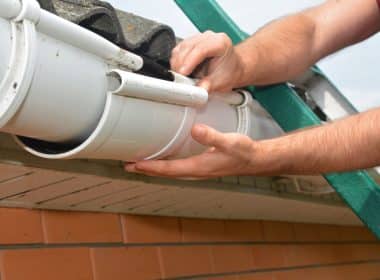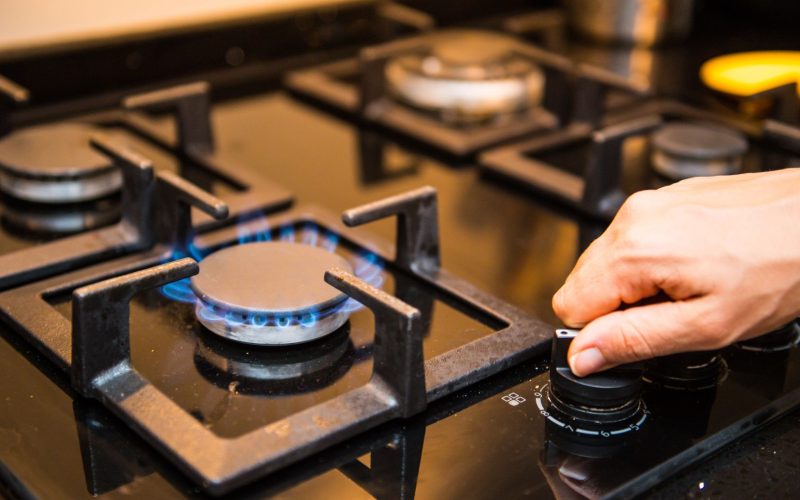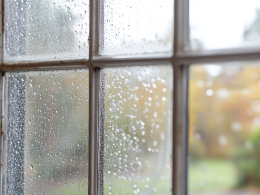Detecting a gas leak in your home can be a serious safety concern, as natural gas leaks can be highly dangerous if left unattended.
Ignoring the warning signs of a gas leak can put you and your family at risk.
In this article, I’ll share 9 common indicators and symptoms that can help you identify a gas leak quickly so you can take the necessary actions to address the issue.
From strange odors to wilting plants, this guide will help you identify the signs of a gas leak so you can act quickly to keep your home safe.
Signs of a Gas Leak

1. Rotten Egg Odor
The natural gas piped into your home smells like rotten eggs or sulfur, and the gas company intentionally adds this unpleasant odor.
They add a chemical called Mercaptan to the natural gas to make it easier for you and your family to detect a gas leak in your home.
If you notice this irritating rotten egg smell, it’s a clear sign that you must take action immediately.
2. Unhealthy Houseplants
If your indoor houseplants look unhealthy, wilting, or even dying, this could be an early warning sign of a gas leak in your home.
A gas leak reduces the amount of oxygen in the air, which can harm both people and plants. The lack of oxygen causes the plants to become distressed and deteriorate.
3. Dead Grass and Bushes
If you go outside and notice patches of dead or discolored grass and bushes in your yard, this may indicate a gas leak underground.
The escaping gas displaces the oxygen in the soil, causing the plants to wither and die. This is a clear visual cue that something is wrong with your gas lines, and you should have them inspected by a professional.
4. Discolored Flames
Gas-powered appliances like your stove or furnace should produce a nice blue flame when working properly.
If you notice the flames are burning yellow or orange instead, this could mean there’s a problem with the gas flow, potentially indicating a leak.
Improper combustion leads to this discoloration, so pay attention to the flames on your gas appliances.
5. Hissing or Whistling Sound
Another sign to watch is a hissing or whistling noise from your gas lines or appliances. This high-pitched sound may mean a leak, allowing the gas to escape.
Your ears can be an early detector – if you hear any unusual sounds from your gas system, it’s time to check it out.
6. Bubbles in Water
If you notice bubbles forming in standing water or puddles around your home, it could indicate a gas leak underground.
The escaping gas can cause these bubbles to appear on the water’s surface. This indicates that the gas is seeping up from beneath the ground and needs to be addressed promptly.
7. Visible Damage to Gas Pipes
Cracks, breaks, or other visible damage to your home’s gas pipes or connections clearly indicate a leak that needs to be addressed immediately.
If you see any issues with the physical gas lines, don’t hesitate to call a professional to inspect and repair the problem.
8. Dust or Debris Blowing from a Hole
If you see dirt, dust, or other debris being blown into the air from a hole in the ground, this could mean that natural gas is escaping from an underground pipe and forcing the debris up.
This is a telltale sign that your gas lines have been compromised and require professional attention.
9. Higher Gas Bills
An unexplained increase in your monthly gas bills, without changes to your usage, can sometimes signal that you have a slow, ongoing gas leak in your home.
While this may not be as dramatic as some other warning signs, it’s still an indicator that you should check your gas system for any potential issues.
Symptoms of Gas Leak on Health

1. Headaches
If you or your family members start experiencing persistent or severe headaches, it could be a symptom of exposure to a natural gas leak in your home. Gas buildup can cause headaches, depriving your body of oxygen.
Don’t ignore frequent or worsening headaches, as they may be an early warning sign of a dangerous gas leak situation.
2. Nausea
Feeling nauseous or even vomiting can also be a sign that you’re being affected by a gas leak. Natural gas inhalation can disrupt your body’s normal functions and lead to an upset stomach.
If you or anyone in your household starts feeling sick to their stomach without explanation, it’s time to investigate the possibility of a gas leak.
3. Fatigue
Unusual or excessive tiredness and drowsiness can be another symptom of prolonged exposure to a gas leak. As the gas builds up in your home, it robs the air of oxygen, causing you and your family to feel overly tired.
If you notice everyone in the house seems abnormally lazy, it’s a red flag that something could be very wrong.
4. Dizziness
Inhaling natural gas can also cause lightheadedness or a spinning sensation. The lack of oxygen in the air due to gas buildup can lead to dizziness and disorientation.
If you or your loved ones feel dizzy for no apparent reason, it’s crucial to address the possibility of a gas leak immediately.
5. Breathing Difficulties
One of the most serious symptoms of a gas leak is shortness of breath or other breathing issues. As the gas displaces oxygen, breathing becomes increasingly difficult.
Difficulty inhaling and exhaling can be a life-threatening sign that requires urgent attention and evacuation from the affected area.
6. Eye and Throat Irritation
In addition to the more severe symptoms, exposure to a gas leak can also cause irritation or discomfort in the eyes and throat.
You may experience burning, itching, or a scratchy feeling that won’t go away. These types of irritation are the body’s way of reacting to the harmful gas in the air.
7. Chest Pain
Unexplained chest pain is another potential symptom of a gas leak that should not be ignored. The gas can strain your respiratory system, leading to uncomfortable and worrying chest sensations.
If anyone in your home experiences chest pain for no clear reason, treat it as a serious warning sign.
8. Skin Irritation
Direct contact with the gas escaping from a leak can also cause skin irritation, including rashes, blisters, or a general feeling of unease.
Please pay close attention to any skin changes or abnormal sensations that arise, as they may indicate hazardous gas exposure.
9. Confusion
Finally, gas leaks can affect mental function, leading to confusion, disorientation, and difficulty concentrating.
If you or a family member seem unusually confused or “out of it,” it could be a symptom of the gas poisoning your brain by depriving it of oxygen. This is an especially dangerous sign that requires immediate action.
Prevention Measures to Look After
1. Regular Inspections
- Having your gas appliances and lines inspected annually by a professional is one of the best ways to prevent a dangerous gas leak in your home.
- Qualified technicians can carefully examine your entire gas system and identify any potential issues or areas of concern before they become major problems.
- Don’t try to do these inspections yourself—hiring licensed plumbers or HVAC specialists with the expertise to assess your gas setup properly is crucial.
2. Proper Ventilation
- Ensuring your gas-powered appliances, like your furnace or water heater, have adequate ventilation is also key to preventing gas leaks.
- These appliances need proper airflow to function safely and expel harmful byproducts like carbon monoxide.
- Keep the areas around your gas appliances clear and unobstructed, and schedule regular maintenance to ensure the ventilation systems are working properly.
3. Use of Detectors
- Installing carbon monoxide detectors throughout your home is an essential safety measure against gas leaks.
- These devices can alert you if dangerous levels of odorless, colorless gas build up.
- But don’t just set them and forget them – test your detectors regularly to confirm they are still functioning properly.
- Replacing the batteries as needed will keep them in good working order.
4. Following Usage Instructions
- Always carefully read and follow the manufacturer’s instructions for using any gas-powered appliances in your home.
- This includes adhering to guidelines around proper use, regular maintenance, and scheduled tune-ups.
- Cutting corners or improvising with your gas equipment can significantly increase the risk of leaks or other hazardous issues arising.
5. Safe Practices
- Being vigilant about gas leak prevention also means adopting smart safety habits around your home. For example, never start your car in an enclosed garage, as the carbon monoxide exhaust can quickly build up to dangerous levels.
- If you suspect a gas leak, evacuate the area immediately and call in the professionals rather than trying to investigate or fix it yourself.
Conclusion
Recognizing the common signs and symptoms of a gas leak in your home is crucial for keeping your family safe.
Watch for signs of a gas leak, from odd odors to changes in plants and appliances. If you suspect a leak, evacuate immediately and call a professional for inspection and repair.
Your health and safety should always come first. By staying informed and taking proactive prevention measures, you can help ensure a gas leak never becomes a serious threat in your house.
Stay safe and trust your senses to detect any potential leaks early on.











